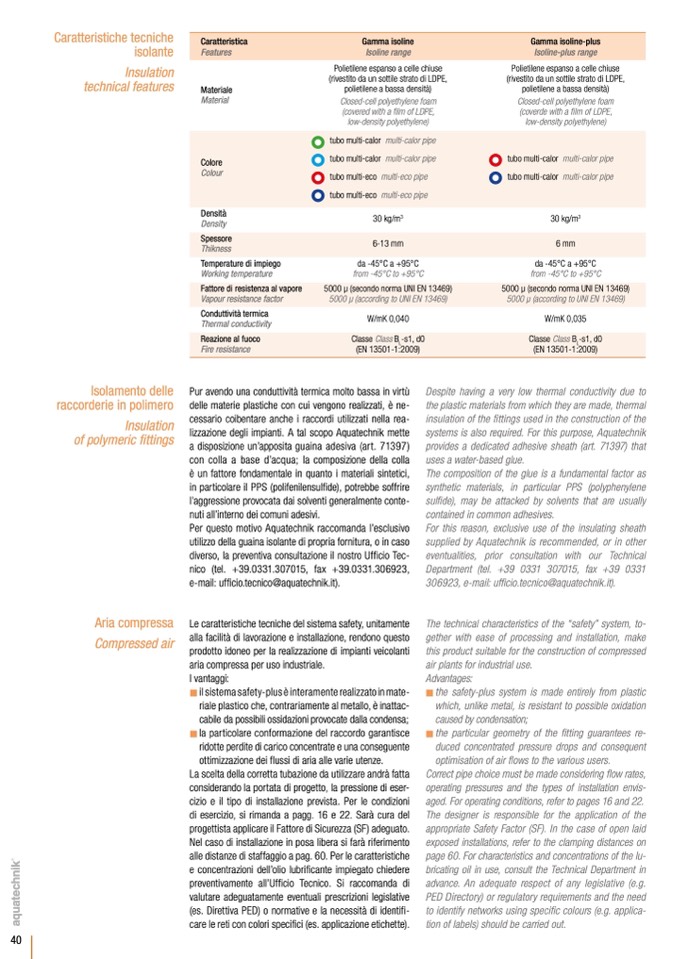
Caratteristiche tecniche
isolante
Insulation
technical features
Caratteristica
Features
Materiale
Material
Densità
Density
Temperature di impiego
Working temperature
Conduttività termica
Thermal conductivity
Gamma isoline
Isoline range
Polietilene espanso a celle chiuse
(rivestito da un sottile strato di LDPE,
polietilene a bassa densità)
Closed-cell polyethylene foam
(covered with a film of LDPE,
low-density polyethylene)
30 kg/m
3
da -45°C a +95°C
from -45°C to +95°C
W/mK 0,040
Colore
Colour
tubo multi-calor multi-calor pipe
tubo multi-calor multi-calor pipe
tubo multi-eco multi-eco pipe
tubo multi-eco multi-eco pipe
tubo multi-calor multi-calor pipe
tubo multi-calor multi-calor pipe
Isolamento delle
raccorderie in polimero
Insulation
of polymeric fittings
Pur avendo una conduttività termica molto bassa in virtù
delle materie plastiche con cui vengono realizzati, è ne-
cessario coibentare anche i raccordi utilizzati nella rea-
lizzazione degli impianti. A tal scopo Aquatechnik mette
a disposizione un’apposita guaina adesiva (art. 71397)
con colla a base d’acqua; la composizione della colla
è un fattore fondamentale in quanto i materiali sintetici,
in particolare il PPS (polifenilensulfide), potrebbe soffrire
l’aggressione provocata dai solventi generalmente conte-
nuti all’interno dei comuni adesivi.
Per questo motivo Aquatechnik raccomanda l’esclusivo
utilizzo della guaina isolante di propria fornitura, o in caso
diverso, la preventiva consultazione il nostro Ufficio Tec-
nico (tel. +39.0331.307015, fax +39.0331.306923,
e-mail: ufficio.tecnico@aquatechnik.it).
Le caratteristiche tecniche del sistema safety, unitamente
alla facilità di lavorazione e installazione, rendono questo
prodotto idoneo per la realizzazione di impianti veicolanti
aria compressa per uso industriale.
I vantaggi:
ilsistemasafety-plusèinteramenterealizzatoinmate-
riale plastico che, contrariamente al metallo, è inattac-
cabile da possibili ossidazioni provocate dalla condensa;
la particolare conformazione del raccordo garantisce
ridotte perdite di carico concentrate e una conseguente
ottimizzazione dei flussi di aria alle varie utenze.
La scelta della corretta tubazione da utilizzare andrà fatta
considerando la portata di progetto, la pressione di eser-
cizio e il tipo di installazione prevista. Per le condizioni
di esercizio, si rimanda a pagg. 16 e 22. Sarà cura del
progettista applicare il Fattore di Sicurezza (SF) adeguato.
Nel caso di installazione in posa libera si farà riferimento
alle distanze di staffaggio a pag. 60. Per le caratteristiche
e concentrazioni dell’olio lubrificante impiegato chiedere
preventivamente all’Ufficio Tecnico. Si raccomanda di
valutare adeguatamente eventuali prescrizioni legislative
(es. Direttiva PED) o normative e la necessità di identifi-
care le reti con colori specifici (es. applicazione etichette).
Gamma isoline-plus
Isoline-plus range
Polietilene espanso a celle chiuse
(rivestito da un sottile strato di LDPE,
polietilene a bassa densità)
Closed-cell polyethylene foam
(coverde with a film of LDPE,
low-density polyethylene)
30 kg/m
3
da -45°C a +95°C
from -45°C to +95°C
W/mK 0,035
Despite having a very low thermal conductivity due to
the plastic materials from which they are made, thermal
insulation of the fittings used in the construction of the
systems is also required. For this purpose, Aquatechnik
provides a dedicated adhesive sheath (art. 71397) that
uses a water-based glue.
The composition of the glue is a fundamental factor as
synthetic materials, in particular PPS (polyphenylene
sulfide), may be attacked by solvents that are usually
contained in common adhesives.
For this reason, exclusive use of the insulating sheath
supplied by Aquatechnik is recommended, or in other
eventualities, prior consultation with our Technical
Department (tel. +39 0331 307015, fax +39 0331
306923, e-mail: ufficio.tecnico@aquatechnik.it).
The technical characteristics of the “safety” system, to-
gether with ease of processing and installation, make
this product suitable for the construction of compressed
air plants for industrial use.
Advantages:
the safety-plus system is made entirely from plastic
which, unlike metal, is resistant to possible oxidation
caused by condensation;
the particular geometry of the fitting guarantees re-
duced concentrated pressure drops and consequent
optimisation of air flows to the various users.
Correct pipe choice must be made considering flow rates,
operating pressures and the types of installation envis-
aged. For operating conditions, refer to pages 16 and 22.
The designer is responsible for the application of the
appropriate Safety Factor (SF). In the case of open laid
exposed installations, refer to the clamping distances on
page 60. For characteristics and concentrations of the lu-
bricating oil in use, consult the Technical Department in
advance. An adequate respect of any legislative (e.g.
PED Directory) or regulatory requirements and the need
to identify networks using specific colours (e.g. applica-
tion of labels) should be carried out.
Aria compressa
Compressed air
Spessore
Thikness
6-13 mm
6 mm
Fattore di resistenza al vapore
5000 μ (secondo norma UNI EN 13469)
5000 μ (secondo norma UNI EN 13469)
Vapour resistance factor
5000 μ (according to UNI EN 13469)
5000 μ (according to UNI EN 13469)
Reazione al fuoco
Classe Class B
L
-s1, d0
Classe Class B
L
-s1, d0
Fire resistance
(EN 13501-1:2009)
(EN 13501-1:2009)
40

